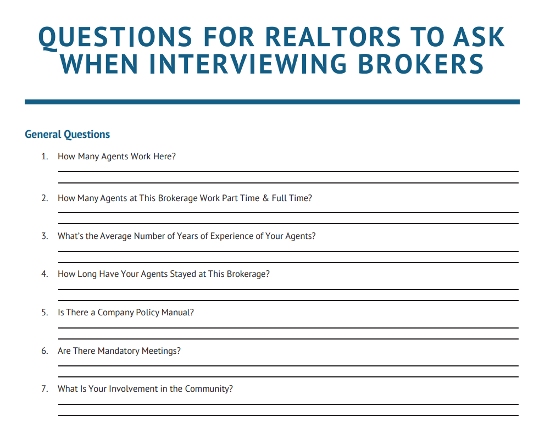Agents should know what questions to ask a real estate broker when interviewing, like company structure, day-to-day operations, and the resources and tools provided. They also should review written company policies and gather information on compensation and commission splits. It’s practical for agents to interview a few brokers because their chosen company significantly impacts their careers.
In this article, we dive into 24 crucial questions to ask a broker when interviewing, with examples of acceptable and unsuitable answers so agents can choose the right company. Download our full real estate broker questions list for free and take it with you on your interview.
If you’re unsure of what you want in your sponsoring brokerage, review our How to Choose a Real Estate Company to Work For article. This will help you feel confident about the establishment you want to join.
General Brokerage Questions
The first few questions might seem simplistic. Still, they’re important to include when you prepare for your interview to make an evaluation of the company and ensure they share the mission and values you hope to attain in your real estate career. They also provide information about the size, policies, culture, and general well-being of the brokerage and its agents.
1. How Many Agents Work Here?
👍Good answer: “We have about X agents currently at XYZ Brokerage.”
🚩Proceed cautiously: “I’m not sure. We have so many agents coming in and out.”
A great response to this question depends upon your preferences and how you wish to conduct your business. However, a wishy-washy answer is a red flag. The broker-in-charge should know how many agents work under the brokerage. It shows an attention to detail and a responsibility to the licensees and clients who do transactions with their firm.
Why Ask?
The number of agents at each brokerage depends on the type of brokerage where you interview. For example, boutique brokerages may have three agents, while franchises have thousands nationwide. A boutique brokerage is probably the best choice if you work in a small town and know your agent colleagues. On the other hand, if you’re in a large metropolitan area and wish to connect with agents throughout the region, a franchise is a better option.
2. How Many Agents at This Brokerage Work Part Time & Full Time?
👍Good answer: “About X% of agents work full-time and X% of agents work part-time.”
🚩Proceed cautiously: “There’s a mix of both.”
This question to ask a broker before joining provides an idea of the type of agents who work in a particular brokerage. A vague answer doesn’t give insightful information on the structure of the real estate firm. If your real estate career is a side hustle and the firm doesn’t want part-timers, it’s critical to know upfront.
Why Ask?
This question can reveal the work habits of agents and lets you decide how you want to structure your schedule. For example, if you intend to work part-time, you probably don’t want to join a brokerage where every agent works 40 hours or more weekly. Considering the expectations and how the brokerage will fit into your lifestyle is critical.
3. What’s the Average Years of Experience of Your Agents?
👍Good answer: “We enjoy having new agents, but many of our agents have 10-plus years of real estate experience.”
🚩Proceed cautiously: “All of our agents have less than a year of experience.”
While hearing that most agents in a brokerage are at a similar stage in their careers may sound appealing to a newly licensed real estate agent, joining a firm with other new agents can cause you to miss mentorship opportunities. Furthermore, if the brokerage is established but the team is young, it may indicate a high level of turnover due to poor management.
Why Ask?
Statistics show that 87% of new agents fail within the first five years. To succeed, surround yourself with experienced agents who understand a competitive market and selling skills and can offer mentorship. Working with knowledgeable real estate agents can provide useful insights if you are new.
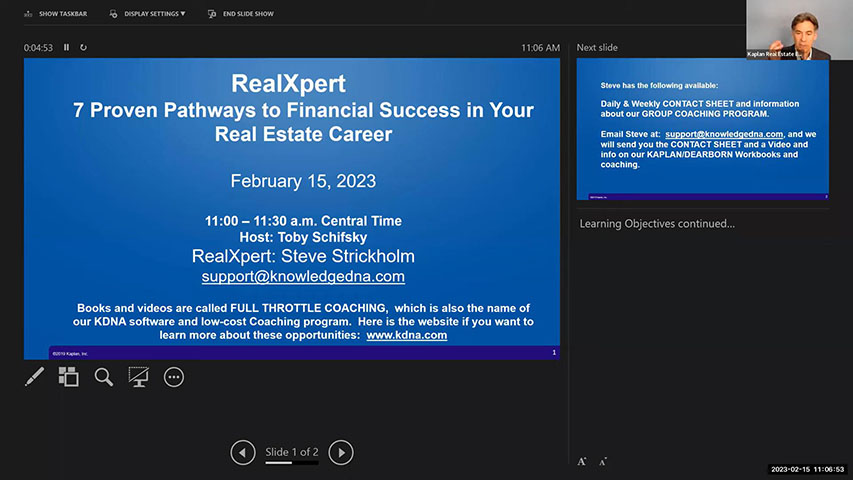
Kaplan professional development video (Source: Kaplan)
If you’re already licensed and struggling to get your career moving, you will benefit from Kaplan’s professional development courses. The Real Estate Accelerator is an eight-hour intensive boot camp program designed to teach agents how to succeed as well as critical business-building skills for successful performance.
Visit Kaplan
Use Promo Code: Kapre5 for 5% off
4. How Long Have Your Agents Stayed at This Brokerage?
👍Good answer: “Most of our agents have been working here an average of 10 years.”
🚩Proceed cautiously: “Well, most of our agents stayed here for 1-2 years.”
If most agents have stayed with the brokerage for only a few years, ask follow-up questions like, “Why have your agents chosen to leave after two years?” or “What reasons have agents stated for leaving your firm?” You might discover that the company has a legitimate reason for its high turnover rates. For example, some may have retired, left because of poor management, or had little opportunity for growth.
Why Ask?
Although agents are not required to stay with the same brokerage for their entire careers, selecting a brokerage that can help you start and grow your career for many years is highly beneficial. This question is a great way to assess how well the brokerage can support agents with varying experience levels.
5. Is There a Company Policy Manual?
👍Good answer: “Yes, here’s a copy for you to review.”
🚩Proceed cautiously: “No, we don’t have a policy manual.”
Every business should have a policies and procedures manual. If they don’t, it’s a big red flag. It shows a lack of organization and accountability. It should provide information about fees, caps on commission splits for your listings, and lead distribution.
Why Ask?
Before entering into a contract agreement, it’s critical to read their manual because it also highlights the brokerage’s standards, values, rules, and expectations. Since you’ll be aligned with this brokerage, you should have similar beliefs and visions for your business.
6. Are There Mandatory Meetings?
👍Good answer: “Yes, we have one mandatory monthly meeting to speak about the goals and financials of the brokerage, market trends, and general news.”
🚩Proceed cautiously: “We never have meetings, and if we do, they’re spur of the moment.”
Real estate agents are independent contractors and do not have the same duties and expectations as employees. You will, however, be responsible for adhering to specific rules from your sponsored brokerage, such as mandatory meetings.
Why Ask?
Mandatory meetings are helpful if you like meeting with your coworkers and are looking forward to receiving training and developing mentor connections. Meetings can also be valuable for observing the inner workings of your brokerage.
7. What Is Your Involvement in the Community?
👍Good answer: “We host charity events where the proceeds go to a variety of foundations.”
🚩Proceed cautiously: “No, we are not hosting and attending community events. We don’t have time.”
Real estate agents and brokers are busy people. However, real estate is a people business, so if the brokerage isn’t involved in the community to some degree, be wary. It could be hosting an event once a year, participating in community events with the whole team, and attending other broker’s events.
Why Ask?
Community involvement is a great platform to boost your reputation and influence, establish connections, get people to know you better, and generate new leads. However, community involvement is about helping other people first and, only after that, promoting yourself and doing it subtly. You don’t want it to appear that you are using noble causes solely for business purposes.
8. Does Your Brokerage Have Social Gatherings?
👍Good answer: “We host and attend social gatherings. We do not require agents to attend, but always encourage people to get to know everyone better.”
🚩Proceed cautiously: “Our firm does not host and attend social gatherings. Those kinds of events are a waste of time.”
Same as the above question, if the firm and its agents are not encouraging social events, be careful. A brokerage must host and attend social events because the real estate industry requires networking, and it provides a way to strengthen the bond between the team. However, hosting and attending social gatherings should not be mandatory, so watch for that too.
Why Ask?
It’s an excellent way to socialize with your colleagues outside of the office and network with others in a relaxed atmosphere. Some social gatherings include team building fun and games or are for holidays, where everyone can share in the season’s spirit.
9. What Is the Company Culture Like?
👍Good answer: “Our firm promotes an open culture, allowing employees at every level to share their ideas, suggestions, and concerns with us.”
🚩Proceed cautiously: “It’s hard to describe our company culture, but we are a competitive group of agents.”
This question reveals the company’s values. Although one meeting cannot reveal everything, you can observe interactions inside the workplace. Asking about company culture also includes asking about workplace diversity. Think about the culture in which you want to work. Spend some time at a brokerage or interview other agents and brokers to determine if it has the culture you’re looking for.
Why Ask?
The most successful companies value the differences among their staff and agents and understand that diverse experiences and skill sets benefit the whole. Be aware that some brokerages have more rivalry than supporting efficient and effective work in an enjoyable environment. While healthy competition between real estate agents is regular, it should not be misconstrued for bad attitudes, fighting, or situations that cause agents to leave.
Remember, employee turnover is an excellent indicator of whether the company has a healthy or toxic culture. Employees often stay longer if the culture is healthy since they are content and happy. Opportunities for continued growth are exciting, satisfying, and people tend to stay. A company with a harmful or toxic culture will have a higher turnover rate.
10. What Are the Brokerage’s Short- & Long-term Goals?
👍Good answer: “Our firm aims to increase our overall brand awareness and market share.”
🚩Proceed cautiously: “Our company has no short-term or long-term goals. We’re just going with the flow.”
All successful businesses have clear goals that they want to attain. The brokerage you choose should similarly strive for development at every step. Pay attention to how the broker speaks about their aims and future ambitions. It can reveal a lack of organization and apathy.
Why Ask?
The firm’s goals should align with the vision you have for your business. For example, if you want to be a listing agent, you’ll need your brokerage to have similar aspirations and training to help you meet these goals.
If you haven’t decided on your business goals, learn how to write a real estate business plan and download our free template.
Agent Support Questions
As a new or experienced real estate agent entering a new firm, it’s crucial to know how the brokerage intends to support you and your business for success. These questions to ask a broker when interviewing help assess if they offer training programs, administrative support, technology, and other resources for you to thrive and acquire the skills to succeed in real estate.
11. What Kind of Training Is Provided?
👍Good answer: “We offer a two-week training program that teaches agents everything from organizing their schedule to generating leads to the entire real estate transaction process.”
🚩Proceed cautiously: “We don’t train our new agents, but we can recommend some good books.”
You want a firm that’s invested in its agents and provides the necessary tools and resources, so steer clear of brokerages without training and support. Training opportunities covering completing a real estate transaction, communicating with clients, and generating leads are vital for success. Experienced real estate agents will also need training if they encounter new technology, services, and policies to develop their skills further and update their knowledge.
Why Ask?
If nothing is offered, you’re either winging it or paying out of pocket for expensive coaching and mentoring. It shows a lack of the broker’s investment in its agents and likely high turnover. Some brokerages have pre-established training programs for new agents; at other brokerages, it falls upon the agent to find a mentor.
12. Are There Mentorship Opportunities?
👍Good answer: “Yes, we provide mentors for our new agents.”
🚩Proceed cautiously: “No, we don’t provide mentorship opportunities for our new agents.”
Many brokerages don’t mentor new agents, but it’s a nice perk when considering a new brokerage. As previously mentioned, the level of training and support from a brokerage indicates the investment in its agents and is vital to your success. If there’s no official program, inquire about the broker’s leadership style and management experience. A managing broker who takes delight in the team’s success is a solid predictor of a high-performing real estate firm.
Why Ask?
Having a mentor will be one of the essential tools in your kit. A mentor who is familiar with your industry and target market will provide you with relevant and practical knowledge, like real estate trends and how to generate leads. Some brokerages offer a six- to 12-month mentoring program.

Free on-demand video with Colibri and Buffini & Company (Source: Colibri Real Estate)
If you’re looking for online career coaching, Colibri Real Estate has partnered with Buffini & Company to offer coaching and training at no extra cost in its post-licensing course packages. Licensees can watch hundreds of on-demand videos on different topics to gain real-world knowledge and experience to apply to their real estate careers.
Visit Colibri Real Estate
Use Promo Code: FSB30 for 30% off
13. Who Do I Speak With if I Have Client- or Transaction-related Questions?
👍Good answer: “If our agents have a client- or transaction-related question, they can ask their manager for advice and support.”
🚩Proceed cautiously: “We provide reading materials, but there isn’t anyone specifically to speak with for questions. Agents can try calling the office; if someone is there, they may be able to help with questions.”
The brokerage you choose should provide a system where agents can get answers to their questions and learn how to handle challenging situations. This can be a managing or principal broker, mentor, or seasoned agent. If it’s not the manager, ask about the mentor or agent’s level of expertise.
Why Ask?
Agents of all experience levels will have questions related to clients and transactions. They may run into issues or situations that they’re unfamiliar with and need advice to navigate their way through the process without unnecessary difficulties.
14. What Does Your Firm Offer to New Real Estate Agents?
👍Good answer: “We provide headshots, access to conference rooms, a desk, and business cards for all new agents. Also, we offer marketing stipends, free buyer leads, and continuing education (CE) courses for credit toward license renewal.”
🚩Proceed cautiously: “We don’t provide any agent support. You are on your own.”
Agents entering a new brokerage will need tools to penetrate the market and identify opportunities to help them navigate the industry. While brokerages aren’t expected to provide anything to their incoming agents, many will include a few items to entice them to join the firm and help get their agents off the ground. Here are some standard real estate agent success support tools that many firms offer:
- Free leads
- Continuing education (CE) courses for credit
- Marketing stipends
- Access to the firm’s listing
- Business cards
- Headshots
- No desk fees
15. Is There Administrative Support?
👍Good answer: “Yes, our assistant works from 8 a.m. to 4 p.m. Monday to Friday and takes care of specific tasks.” or “No, we do not have a real estate assistant, but here is how we balance the administrative tasks.”
🚩Proceed cautiously: “No, we don’t worry about the administrative side. It’s up to you to handle your work.”
Most brokerages employ real estate assistants or administrators to assist with paperwork, answering phones, arranging appointments, organizing supplies, and other duties. This will save valuable time and effort and help you stay organized. Be careful to obtain thorough information regarding the administrative tools and assistance that will be provided to assist you in balancing your job.
Why Ask?
Many real estate brokerages don’t have a real estate assistant but are still great real estate companies to work for. Suppose the brokerage does not have an assistant. In that case, the real estate broker and the agents will be responsible for multiple tasks, which is an important consideration when joining a new firm.
16. What Kind of Software or Technology Is Provided?
👍Good answer: “One of the tools we use is Market Leader, which helps agents generate leads and convert them into clients.”
🚩Proceed cautiously: “We don’t use technology tools because we don’t think they’re important. You have the MLS.”
It’s common for franchises and virtual brokerages to provide access to real estate tools, such as customer relationship management (CRM) software, social media management, and task management. On the other hand, boutique brokerages sometimes lack the financial resources to provide the same tools for their agents. Still, they should offer basic things like internet access, a custom web page, an email address, and CRM.
Why Ask?
You will need technology to perform your job well, so having access to some technology helps you launch and grow. A company email address and agent website allow you to share your listings and drive traffic toward you. CRM software helps you stay organized and manage your leads.
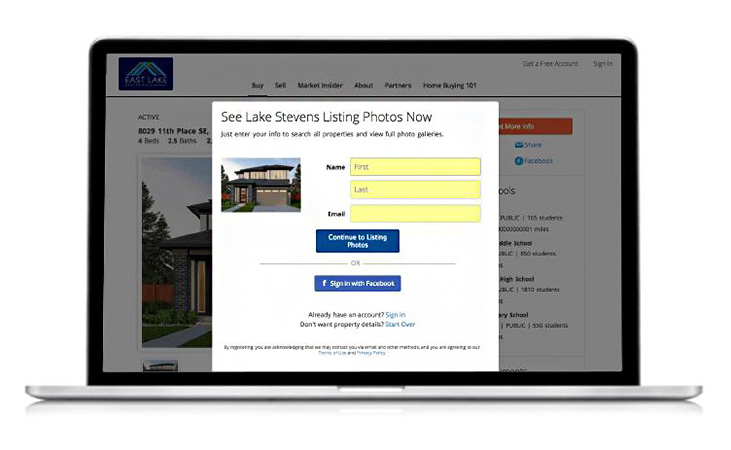
Pay-per-click advertising campaigns (Source: Market Leader)
Market Leader provides an all-in-one solution for generating leads and converting them into lifelong clients. It includes a robust CRM, website, and marketing automation. Its website tools are easy to use, widgets make adding content effortless, and the picture library provides quick access to great stock images. Market Leader guarantees exclusive buyer and seller leads each month based on a ZIP code and lead availability.
Engage more efficiently with buyer and seller leads using Market Leader’s new feature, Network Boost. Network Boost has shown a 40% increase in agents successfully connecting with leads. Market Leader social media experts design highly targeted and optimized ads for your Instagram and Facebook.
As visitors engage with your ads, they will be prompted to complete a form and funnel directly into your Market Leader CRM. This will also trigger an automatic marketing campaign that nurtures your clients and lets you know they are ready to engage with you personally. Try Market Leader’s Network Boost today.
Financial Questions
Another vital factor that agents must know about their potential brokerage is how much they can earn. These questions to ask a broker when interviewing help you assess if the firm is willing to negotiate commissions, if the commission split is fair, and what the real estate fees are. Working for a brokerage that appreciates your expertise and allows you to earn and negotiate compensation based on progress and contributions to the company is essential.
17. What Is the Commission Split?
👍Good answer: “Our commission split is 60/40.”
🚩Proceed cautiously: “Our commission split is 20/80. You will receive 20% commission, while we keep 80%.”
A commission split refers to the amount of money the agent and the brokerage receive when they complete a real estate transaction, and it can vary by the brokerage. Agents need to know the commission split they will receive to estimate their income. While the 20/80 split mentioned above may work for some agents, it is a significantly low commission to receive for any agent completing a real estate transaction, especially if no additional resources or incentives are involved.
Why Ask?
While most people want to earn more money, it’s crucial to understand how your commission and support coincide. For example, your brokerage may offer an 80/20 split, with 80% of the commission going to the agent, but they may not provide any training, agent support, or technology. A 60/40 split, with 60% going to the agent, will offer a comprehensive training program, multiple technological tools, and an administrative assistant.
Even though the latter brokerage is taking more from your paycheck, they offer you tools and resources in return. Use the other information you have gathered about the brokerage to judge which commission split is best for your business.
18. Are Commissions Negotiable?
👍Good answer: “Yes, we are open to negotiating commission splits, but we typically review them after seeing an agent’s progress at the brokerage.”
🚩Proceed cautiously: “No, commission splits are not negotiable.”
If commission splits are non-negotiable, proceed cautiously. Receiving this answer provides an opportunity to discover why. Perhaps the commission split is already generous or due to the number of tools and resources the brokerage provides its agents. The firm could be in its infancy and will open up negotiable commissions once they have enough revenue from the agent’s sales to be more flexible. There are benefits to working for a new brokerage, such as less competition from other agents and helping grow a new business.
Why Ask?
Real estate commission splits, like salaries, are negotiable. While real estate agents must typically pay a certain amount to their broker, they can usually ask for a higher or lower commission split depending on experience and revenue. Real estate agents must know that if you’re offered a lower commission rate, you can refuse and negotiate it for a higher commission rate. However, if you are a new agent, you may have to wait before negotiating until the brokerage can see your performance.
19. What Are the One-time & Ongoing Fees?
👍Good answer: “You must pay E&O insurance in a lump sum, pay for an annual MLS fee, and the technology fee is $100 monthly.”
🚩Proceed cautiously: “I don’t think there are any additional expenses.”
This is a big red flag. The broker should know what fees their agents are responsible for. Most real estate agents incur membership and marketing fees, but each firm manages its finances differently. Get a clear response to what costs you will be accountable for and ask questions about these fees to understand how each brokerage will impact your income.
A few ordinary expenses are:
- Desk fees
- Annual National Association of Realtors (NAR) membership
- Training
- MLS fees
- Technology
- Printing fees for mailers, business cards, and so forth
- Errors and omissions (E&O) insurance
Why Ask?
In this case, the word of caution in the brokerage response is “think.” A high-performing broker should be able to supply you with a list of recurrent expenditures so that agents working under their supervision can budget accordingly.
20. What Is the Average Income of Your Agents?
👍Good answer: “Many of our full-time agents make between $70,000 and $100,000 annually.”
🚩Proceed cautiously: “They probably all make $50,000.”
Here’s another area to proceed cautiously. All brokerages have agents earning different incomes. But something isn’t right if they’re all making money at the lower end. Are they not motivated? Do they work part-time? Is there no training?
A real estate agent’s income depends on if they work in a niche, their years of experience, and how many hours they put in. According to Colibri Real Estate, agents working 40 to 50 hours a week can expect to make around $113,054. Agents who work between 51 and 59 hours a week can expect to earn approximately $143,469, before realtor taxes and deductions.
Why Ask?
Knowing the range of earnings provides good intel about what agents in the office are doing and where you’ll fit in. For experience, a mid-career real estate agent might earn between $149,000 and $164,000. However, the average income for an agent working in a niche falls in the $130,000 range. Some real estate niches, like affordable housing, have notably lower incomes, while luxury and commercial properties have markedly higher earnings.
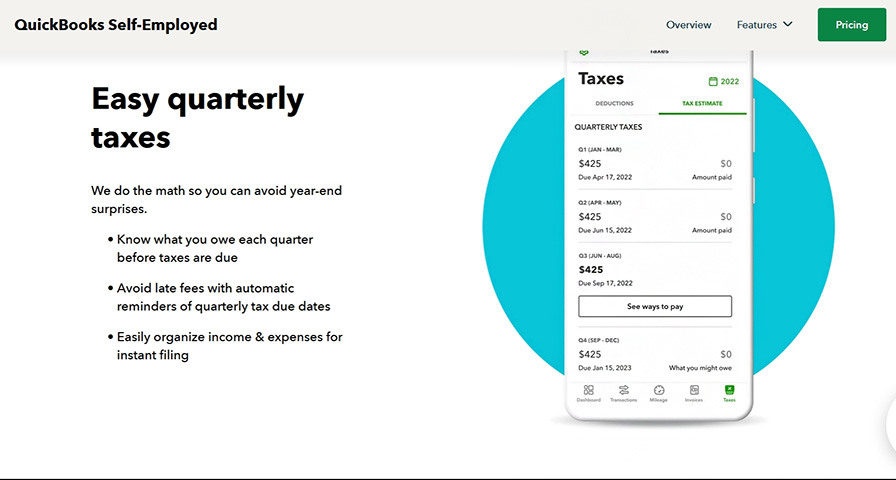
Mileage tracking with QuickBooks Self-employed (Source: QuickBooks)
As a self-employed real estate agent, you are required to file your federal taxes quarterly. You must track your income, expenses, and mileage and estimate your quarterly payments. With QuickBooks Self-employed, you can know what you owe each quarter, conveniently organize expenses, and track mileage in one place.
Lead Generation & Marketing Questions
It’s necessary for you to know the lead generation and marketing strategies the brokerage uses to build the business. While you will use your own lead generation strategies, if your brokerage has additional ways to capture and convert leads, it’s helpful to supplement your business.
Also, a brokerage’s marketing and branding will directly reflect your industry reputation. These questions to ask a broker when interviewing reveal whether the brokerage has solid lead generation and marketing plans and if they can be beneficial for you.
If you’d like more information on how to generate and manage qualified leads, check out these articles:
- 18 Real Estate Prospecting Tips That Generate New Leads
- How to Advertise on Zillow in 10 Steps (+ Free Checklist)
- 6 Best Real Estate Lead Generation Companies 2023
21. What Is Your Target Market & Niche?
👍Good answer: “Our business’ niche market is condo owners, and here’s why…”
🚩Proceed cautiously: “Well, we don’t have any niche market; we serve everyone.”
In this context, having “everyone” or no target market or niche harms sales and company growth. If you don’t know your target audience, you won’t be able to utilize the right language or address the most essential issues for clients. Your marketing, website content, and ad campaigns will be less successful.
Why Ask?
Brokerages must carve out a niche and target market to position their firm as the go-to for a specific audience. It builds their reputation and results in a more focused business. Specializing in a specific market makes attracting customers easier for agents and brokerages.
22. Where Do You Focus Your Marketing Efforts?
👍Good answer: “We have found that social media outreach is the best way to connect with first-time millennial homebuyers, and our email list helps us nurture previous clients.”
🚩Proceed cautiously: “Our business comes from friends and family or walk-ins, so we don’t focus on being seen online.”
Approximately 72% of people in the U.S. use social media, more than two-thirds of its population. You want to be where the people are, so if the broker sees that being online is a waste of time, or they feel they have enough business from friends, family, and those who happen off the street, they’re missing many potential clients.
Why Ask?
Successful marketing efforts include acquiring new leads, converting them into customers, and constantly expanding your network and reputation. However, the ideal approach to achieve this depends on your area and target market. You could use online, direct mail, Google advertising, or social media marketing. Besides, a great managing broker will know which marketing methods work and which don’t work in your area.
While the strength of a referral network will play a vital role in the success of any agent, more and more business is conducted online each year. In addition to running out of leads, a brokerage that doesn’t care about its online presence also risks being seen as out-of-date or not credible.
23. How Many Listings Does Each Agent Currently Have?
👍Good answer: “We currently average around 10 listings per agent.”
🚩Proceed cautiously: “Some agents have 20 listings, and some have two listings.”
A brokerage may have many listings, but the distribution and system used to manage those listings impact the opportunities an agent will receive. While most brokerages have a few top producers, it might be a concern if one or two agents have the bulk of listings and other agents are having difficulty finding any. This might indicate that the brokerage fails to support and encourage its agents.
Why Ask?
Most agents build their cache of prospects, but brokerages get walk-ins, emails, referrals, and phone calls from prospective clients. You will want to know how those prospects are distributed. As mentioned above, you also want to understand why there is an imbalance. It could be a lack of agent support or mismanagement of the brokerage.
24. How Are Leads Distributed & Qualified?
👍Good answer: “We use an automated system that rotates the distribution of each lead.”
🚩Proceed cautiously: “I tend just to give them to anyone near me at the time.”
When a buyer or seller contacts a brokerage for assistance, the brokerage has many options for transferring the lead. They can distribute leads by seniority, price point, round-robin, or first-come, first-served basis. How they decide to distribute leads reveals a lot about how the brokerage is managed and if they value fairness and transparency.
Why Ask?
According to an Inman survey, 60% of real estate brokers believe their firm distributes leads unfairly, so it’s essential to ask this question. Additionally, finding clients without a track record is challenging if you’re newly licensed or in a new location. If leads are distributed fairly, you can be assured you will have some business while you ramp up your sphere of influence and leads database.
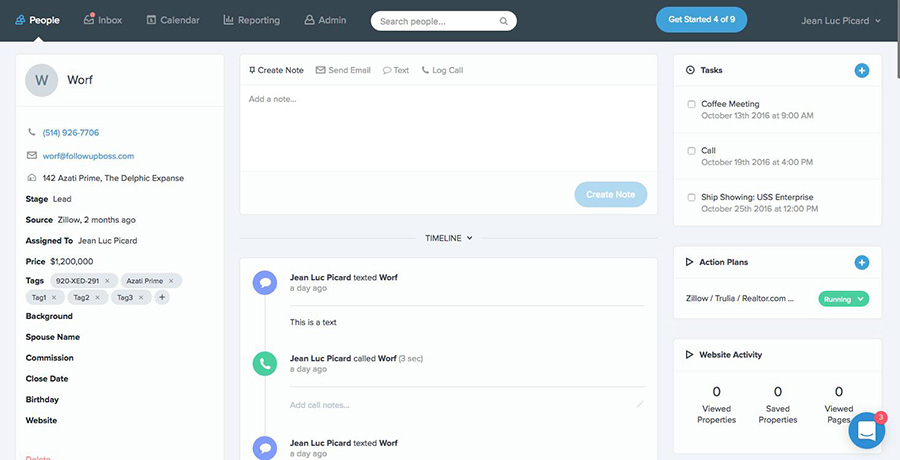
Follow Up Boss’ dashboard for managing leads (Source: Follow Up Boss)
Lead distribution systems benefit agents and the brokerage, guarantee clients are taken care of, and agents have a sufficient business. Follow Up Boss provides automation tools to generate and move real estate leads through the sales pipeline. It also offers essential features like workflow automation, allowing agents to engage with leads by sending a follow-up email or a greeting on their birthday.
Bottom Line
As you gather answers to these interview questions, remember each brokerage is different in structure, values, operation, and management styles. Even if they offer you an answer that doesn’t align with your values, it doesn’t mean it is wrong—it may just be the wrong brokerage for your needs. Instead, see it as a hint that you should ask follow-up questions for further clarity.
Frequently Asked Questions (FAQs)
A good broker is approachable, knowledgeable, and supportive. They must understand your market area, state and federal laws on real estate transactions and antidiscrimination, and offer guidance and support when needed.
A broker is a people manager, so communication is an important skill they should possess. Although you are an independent contractor, which makes you your own boss, the broker-in-charge has certain requirements laid out when you join or change brokerages that you still need to adhere to as part of your agreement.
Prepare interview questions in advance and consider how the environment you’re looking for fits into your goals, lifestyle, and expectations of the company culture. Review your resume and update it if needed. Highlight your strengths and accomplishments. Dress in business attire, such as a white or light-colored shirt and blazer, with a skirt or dress pants. Above all, don’t be nervous. If you work hard, you will bring much to the brokerage. It’s different from interviewing for employment since you’ll run a small business.
If you want to impress a broker to take you on as an agent, show your passion, enthusiasm, and accomplishments at school, other jobs, or volunteer work you’ve done. Selling yourself without sounding braggadocious and remaining humble goes a long way. Also, show how driven you are to succeed. Use SMART goals that are Specific, Measurable, Achievable, Relevant, and Time-bound. Be confident, not cocky, and smile.
